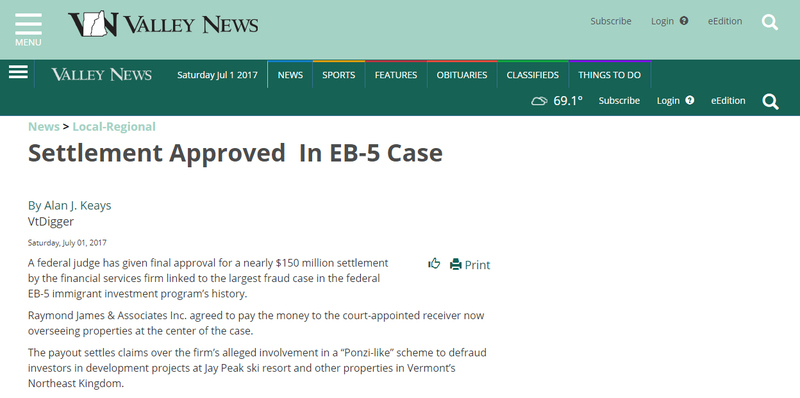A federal judge has given final approval for a nearly $150 million settlement by the financial services firm linked to the largest fraud case in the federal EB-5 immigrant investment program’s history.
Raymond James & Associates Inc. agreed to pay the money to the court-appointed receiver now overseeing properties at the center of the case.
The payout settles claims over the firm’s alleged involvement in a “Ponzi-like” scheme to defraud investors in development projects at Jay Peak ski resort and other properties in Vermont’s Northeast Kingdom.
Raymond James admitted no wrongdoing.
Judge Darrin P. Gayles signed off on the agreement on Friday in federal court in Florida. The developer of the projects, Jay Peak owner Ariel Quiros, lives in Florida, and many of the actions against him were brought in court there.
The judge’s approval was widely expected. He had granted preliminary approval of the deal shortly after it had been announced in April at a Statehouse news conference with Vermont Gov. Phil Scott and Michael Goldberg, the receiver.
However, shortly after the deadline passed, a Chinese investor did file a letter with the court raising objections to the settlement.
In response, Goldberg said the investor’s criticisms, while regrettable, weren’t grounds for rejecting the agreement.
The settlement calls for the money to be used for a variety of purposes. Those include paying contractors and vendors for services that went unpaid, completing projects that remain unfinished, and compensating some of the investors who put $500,000 each into developments that never materialized.
The agreement also includes $25 million for attorneys representing investors to compensate them for dropping lawsuits against Raymond James. Several had been filed, including one proposed class-action case.
The settlement calls for a “bar order,” which protects Raymond James from such lawsuits now that the agreement has been approved.
Raymond James is a financial services company Quiros used. Last year, state and federal regulators lodged lawsuits against Quiros and his onetime business partner, Bill Stenger, Jay Peak’s former CEO and president.
The lawsuits alleged the two developers raised more than $350 million through the EB-5 visa program for immigrant investors and misused more than half of it. Money from investors meant to fund specific projects was used to backfill earlier projects experiencing shortfalls, regulators said.
Goldberg, in a lawsuit last year against Raymond James, alleged the firm “aided and abetted” Quiros in a “Ponzi-like” scheme in which he misused investor funds and “looted” more than $50 million.
“We believe this resolution is fair and representative of our commitment to redressing the victims’ losses in this case,” Jonathan Santelli, Raymond James executive vice president and general counsel, said in a statement after the settlement was announced in April.
http://www.vnews.com/JUDGE-GIVES-FINAL-OK-TO-FINANCIAL-FIRM-S-SETTLEMENT-IN-EB-5-CASE-11038997
Mentions
Litigation Cases
- State of Vermont vs Bill Stenger & Ariel Quiros
- UNITED STATES SECURITIES AND EXCHANGE COMMISSION vs Ariel Quiros & Bill Stenger
States
- Vermont
Securities Disclaimer
This website is for informational purposes only and does not constitute an offer or solicitation to sell shares or securities. Any such offer or solicitation will be made only by means of an investment's confidential Offering Memorandum and in accordance with the terms of all applicable securities and other laws. This website does not constitute or form part of, and should not be construed as, any offer for sale or subscription of, or any invitation to offer to buy or subscribe for, any securities, nor should it or any part of it form the basis of, or be relied on in any connection with, any contract or commitment whatsoever. EB5Projects.com LLC and its affiliates expressly disclaim any and all responsibility for any direct or consequential loss or damage of any kind whatsoever arising directly or indirectly from: (i) reliance on any information contained in the website, (ii) any error, omission or inaccuracy in any such information or (iii) any action resulting therefrom.




